
Read On
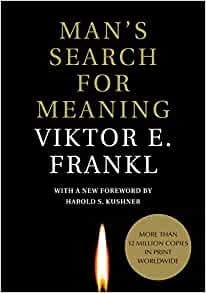
- Man’s Search For Meaning, Viktor Frankl
There’s no specific order or ranking to any of the books on this list — but this one appears first for a reason. On my podcast, I ask all my guests to name one book of any genre they believe “everyone in the world must read.” Remarkably, after producing over 100 episodes, “Man’s Search For Meaning” has been named the majority of the time!
In the fall of 1942, prominent Jewish psychiatrist and neurologist, Viktor Frankl, was sent to a Nazi concentration camp along with his family. Three years later, his camp was liberated and he was freed — but his brother, parents, and pregnant wife all perished.
Despite experiencing unfathomable pain and loss, Frankl had the astonishing courage to write this book in just nine days and to see it published less than a year after he’d regained his freedom.
Frankl’s grand conclusion is that when any of us is faced with great suffering in our lives, we can choose how to cope with it, find meaning in it, and move forward with renewed purpose. Frankl worked as a counselor and therapist in his camp and observed that people who found meaning in their most harrowing circumstances were far more resilient than those who didn’t. Very often, it defined who survived the ordeal and who didn’t.
Frankl cites the example of two suicidal men who believed they had nothing left to live for. “In both cases, it was a question of getting them to realize that life was still expecting something from them,” he writes. For one man, it was his young child who was living in a foreign country. For the other — a scientist — it was a series of books he needed to finish. About both men, Frankl famously explained that no human being will ever be able to throw away his life: “if he knows the ‘why’ for his existence, he’ll be able to bear almost any ‘how.’”
When life doesn’t go as we hope or plan, it’s a very human tendency to succumb to victimhood and to curse the gods, bad fortune — and/or other people. But Frankl wisely asserts that we have a choice in those moments on how to frame our circumstances. “Between stimulus and response, there is a space. In that space is our power to choose our response. In our response lies our growth and freedom.”
One Great Take-Away: Frankl reminds us that finding meaning in life almost always requires that we devote ourselves to “giving” rather than “taking.” “The more one forgets himself — by giving himself to a cause to serve or another person to love — the more human he is.”
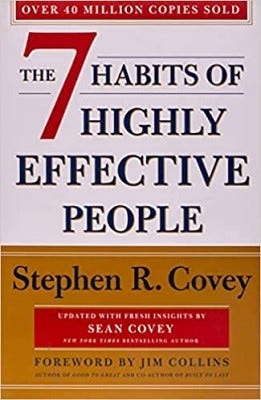
2. “The 7 Habits Of Highly Effective People,” Stephen R. Covey
Published in 1990, this book has since sold over 40 million copies in 40 different languages. In it, Covey makes it abundantly clear that before any of us can effectively lead others, we must first master leading ourselves.
A few years ago, Stephen M.R Covey (Covey’s son and also a bestselling author), told me that his father spent years teaching what would later become the “7 Habits” to members of his church and students at Brigham Young University. It was only after Covey Sr. truly perfected them that he began work on his masterpiece — a spiritually informed system of habits that is both simple and brilliant:
Habit 1: Be Proactive
Deeply inspired by the work of Viktor Frankl, Covey doubles down on the understanding that each of us owns full responsibility for our lives and cannot allow ourselves to be controlled by circumstances.
Habit 2: Begin with the End in Mind:
Asking us how we want to be remembered at our funeral, Covey says to use our answers as the basis for our everyday behavior. “Let your values drive your actions.”
Habit 3: Put First Things First:
Embedded in this habit may be the best time management strategy ever invented. He urges us to identify the key roles we have in life (e.g. as spouses, parents, employees, friends, and managers), and to prioritize these when building our daily and weekly calendars. That way, the things most important to us are never at the mercy of the trivial or insignificant.
Habit 4:Think Win/Win:
In the world of business, we’ve all been taught to believe that any time we win, someone else must lose. Covey’s contrarian wisdom, however, is that if we approach negotiations with an abundance mentality, and seek solutions that benefit all parties, we’ll discover there’s always plenty for everybody — usually more for everybody.
Habit 5: Seek First to Understand Then To Be Understood:
Simply: diagnose before prescribing. Listen with the intent to understand, not with the intent to reply.
Habit 6: Synergize
Concerning leadership, Covey emphasizes that diversity — of people and ideas– is a great strength of high-performing teams. “Respecting differences means giving people the freedom to think, and to consider their views as deeply as our own,” he says. “Differences show us where our vision is incomplete. They open windows into worlds other than our own.”
Habit 7: Sharpen the Saw:
“Keeping tools sharp applies not only to physical instruments but also to ourselves,” says Covey. And at a time when so many of us feel burned out and out of balance, we’re reminded of the importance of habituating activities that support our physical, mental, social-emotional, and spiritual well-being.
One Great Take-Away: Covey says our relationship with others is analogous to an “emotional bank account,” and how much trust we earn from others is based on the balance of that account at any point in time. Acts of kindness, keeping promises, and expressions of appreciation are all deposits. Unkind behavior, breaking promises, and taking people for granted are all withdrawals. Overdrawing your emotional account with someone and regaining their trust may prove impossible.
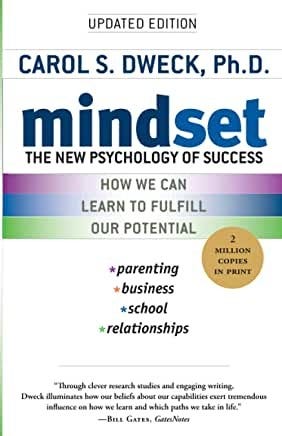
3. Mindset: The New Psychology Of Success, Carolyn Dweck
Leveraging 20 years of her research, Stanford University professor, Carol Dweck, proved that the beliefs we have about ourselves “profoundly affect the way we lead our lives and often determine whether we become the person we want to be and accomplish the things we value.”
And our success, she found, largely boils down to whether or not we believe our qualities and traits are carved in stone (“fixed mindset”) or can be cultivated and improved upon through personal effort (“growth mindset”).
Tom Wolfe, in “The Right Stuff” describes a group of elite military pilots who eagerly embrace the fixed mindset. Having passed one rigorous test after another, they begin to see themselves as special — people born smarter and braver than others. But Chuck Yeager, the hero of the book who was also the first pilot in history to fly faster than the speed of sound, begged to differ. “There is no such thing as a natural-born pilot,” he says. “Whatever my aptitude or talents, becoming a proficient pilot was hard work, really a lifetime’s learning experience. The best pilots fly more than others, that’s why they’re the best.”
Dweck’s impressive insight is that while people tend to prize natural endowment over earned ability — “We revere the naturals” — truly great achievements are the result of continued learning, stretching oneself, and believing that failures will not define us. “People with a growth mindset know that it takes time for potential to flower.”
What I love about this book is its application to leadership. I can’t tell you the number of times in my career when I inherited a new team and was told by the departing manager that certain people were unable to grow further or contribute at a higher level. But growth-minded leaders start with a belief in human potential, development, and coaching. They believe any person’s true potential is unknown and unknowable — “that it’s impossible to foresee what can be accomplished with years of passion, toil, and training.”
One Great Take-Away: “You have to apply yourself to become a bit better. By applying yourself to the task of becoming better, over some time, you will become a lot better.” ~ John Wooden
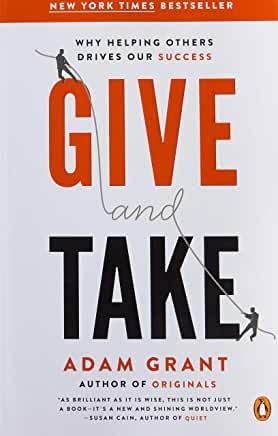
4. “Give And Take,” Adam Grant
St. Francis of Assisi famously said that “for it is in giving that we receive,” and that’s an idea at the core of most spiritual traditions: If you focus your attention and energy on making a difference in the lives of others, your success will naturally follow.
But it took a Wharton business school professor — with data — to rationally convince cynical people in business to broaden their view of success to include contributing to the well-being and growth of others — not just to their achievements. Harkening back to Stephen Covey who urges us to think “win-win,” Grant’s research proves that generosity toward others — giving to others in some meaningful way — is very often what leads to fulfilling our dreams of life.
Grant describes three different people in the world: “Givers,” “Matchers” and “Takers.”
“Givers” give to give. They expect nothing in return.
“Matchers” are known to say “you scratch my back and I’ll scratch yours.” When they give to someone, they are, in the words of Marcus Aurelius, “always looking for a chance to call it in.” “You owe me one” is the thinking of a matcher.
“Takers” like to get more than they give — they ask for favors and rarely reciprocate. Their goal is to come out ahead on every exchange.
Based on these definitions, Grant asks the question, “which of these three orientations tends to be the least successful in the workplace (via performance reviews, promotions, etc.)?” And he answers that the “givers” tend to fail most because they too often focus on helping others get their work done at the expense of completing their own.
His next question is “which of these three orientations then tends to be the most successful in the workplace?” and it has a surprising answer. “As Grant told me right before his book was published, “’ givers’ always come out on top; but there’s one caveat. They must find ways to advance their interests while giving to others.” The point is that all of us can be self-interested and others interested at the same time — and, indeed, we must.
One Great Take-Away: Karma is real. Giving builds deeper relationships that lead to unexpected opportunities. People who put the best interests of the team first are most valued by the rest of the team. The universe always mirrors back whatever you do.
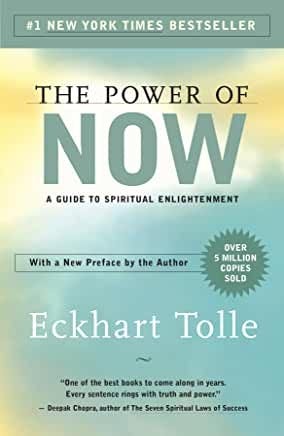
5. The Power Of Now, Eckart Tolle
The primary thesis of Eckart Tolle’s book is that dwelling on regrets about the past, and worrying about the future, take us away from the only moment that is fully available for us to take any meaningful action — the Now. Tolle’s piercing observation is that we humans too often allow the past and future to poison and distract us from the present. And he makes it emphatically clear that when any of us is faced with problems and challenges, our best strategy is always to deal with them at that moment.
Say you are leading a large project that is suddenly faced with delays. If you’re like most humans, your mind fast forwards to — and starts worrying about — the future, and all of the imagined consequences that will come from not completing things on time. But all of the pain and suffering we experience when pondering that kind of dark future can be largely avoided by taking all the actions that need to be taken at that moment.
This book is also about how our minds function and the negative impacts of our ego. Left unwatched, unchecked, and unmanaged, the voice in our head is allowed to control our thoughts (and later actions) without our knowledge. The remedy for this is “mindfulness,” where we realize the self-sabotaging and fear-driven thoughts we often hear are the voice of our ego, not our own.
When the average person plays a game of golf or tennis, they’ll often let the memory of a bad shot spoil their next shot — even the rest of their game. But when we observe champions like Tiger Woods or Roger Federer play these games, a big part of their greatness is that they can acknowledge the bad shot and then instantly release it and move on.
That’s the kind of mastery we can all attain. And it’s the kind of mindset all of us need to deal with the stresses and setbacks of our everyday work life.
One Great Take-Away: Accept what is, then act. Tolle says whatever the present moment contains, “always work with it, not against it. Make it your friend and ally, not your enemy. This will miraculously change your whole life.”
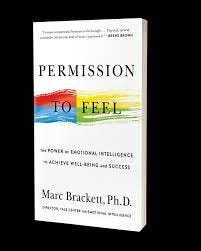
6. Permission To Feel: Unlocking The Power Of Emotions, Marc Brackett
“Our emotions are a big part — maybe the biggest part — of what makes us human. And yet we go through life trying to pretend otherwise.”
Yale University’s Marc Brackett makes this assertion as he launches his book, and it’s a piece of wisdom many workplace managers either reject or overlook. While we prefer to believe humans are fully rational creatures, the truth is all people, including those we manage, are motivated mostly by their feelings and emotions.
Until the 1980’s most psychologists viewed emotions as extraneous noise, useless static. “Our feelings slow us down and get in the way of our achieving our goals.” We’ve all heard this message and even express it ourselves. “Don’t be sensitive.” “Stop focusing on yourself.” “Time to move on.” But in 1990, two Harvard psychologists introduced the first formal theory of emotional intelligence. And they declared that the majority of life’s tasks are influenced by emotions. “Emotions give people purpose, priority, and focus to their thinking. They tell us what to do with knowledge and motivate us to act.”
From my point of view, this message hasn’t gotten through in business nor appropriately applied to how we lead and manage our employees. This book gives us a roadmap for better recognizing, understanding, navigating, and more effectively mastering our emotions — not to mention those of others around us. Notably, my podcast interview with Brackett is one of the most downloaded episodes ever.
One Great Takeaway: Positive and negative emotions cause different physiological reactions within our bodies and brains, releasing powerful chemicals that, in turn, affect our physical and mental well-being. Never forget that humans are hardwired to thrive on positive emotions.
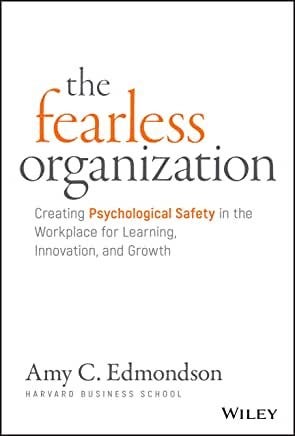
7. The Fearless Organization: Creating Psychological Safety in the Workplace, Amy C. Edmondson
Researchers at Google devoted five years to identifying the commonalities of all high-performing teams, ultimately proving they shared five key qualities. And of those, “psychological safety,” was far and away the most important dynamic overall.
Google only later discovered that Harvard business school professor, Amy Edmondson, had a ten-year start on the research, and had become one of the world’s experts on the topic.
While many workplace managers believe fear is a powerful motivator of employee performance, Edmondson tells us that “fear is the enemy of human flourishing.” To quote Edmond Burke in the 18th century, “No passion so effectively robs the mind of all its powers of acting and reasoning as fear.”
If fear undermines human well-being and effectiveness, Edmondson argues that feeling psychologically safe (and, inherently, emotionally safe) is what allows human beings to perform optimally in their jobs. And by that she means managers have created a climate where people are comfortable being themselves, expressing themselves, and taking interpersonal risks. As Bartleby in the Economist once described it, “it’s the equivalent of Toyota’s ‘lean manufacturing’ process which allows any worker who spots a problem is allowed to stop the line.”
In a team with high psychological safety, teammates feel assured no one will embarrass or punish them for admitting a mistake, asking a question, or offering a new idea. And the truth is, it takes a lot of leadership know-how and will to create a team culture like this. Amy Edmondson shows us the way.
One Great Take-Away: A 2017 Gallup poll found only 3-in-10 employees strongly agreed with the statement, “my opinions count.”

8. The Autobiography Of A Yogi, Paramahansa Yogananda
Before Apple founder, Steve Jobs, died in 2011, he planned every detail of his funeral service. He went so far as to buy every attendee a farewell gift which he had boxed up and wrapped. Inside each box was a copy of “The Autobiography of a Yogi.”
That kind of thoughtfulness suggests Jobs wanted to leave his friends, family, and former colleagues with one final piece of wisdom to ponder as he left the planet. And by no coincidence, it was an idea that played a profound role in his uncommon success: Intuition is a profound gift that allows us to transcend the workings of our minds. Job’s final act in life was to urge people to look at the world from the inside out — because he believed our inner knowing is what grants access to the infinite potential within us all.
This is also a book about the power of meditation, but the swami’s descriptions of his spiritual journeys, along with those of the masters who taught him, are what profoundly alter our understanding of the world we live in. It’s mystical, astonishing, and enlightening all at once. And there are stunning insights about life and true well-being on every page. “Happiness is an inside job; it cannot be found externally.” “Look fear in the face and it will cease to trouble you.” “Our five senses are not our only means of knowledge.” “Intuition is soul guidance appearing naturally in man during instances when his mind is calm.”
While I was struggling greatly to complete the first edition of my book, I took a drive one Sunday to tour Yogananda’s Encinitas, California hermitage where he wrote his autobiography. His writing room has been preserved exactly as he left it over seventy-five years ago, and his energy remains in the space. Call it what you will, but when I went home afterward, I felt deeply inspired. And I tapped into those feelings — and, I believe, his spirit — to finish what I feared I could not.
When Steve Jobs died, Yogananda’s autobiography was the only book found on his IPad. Former Beatle, George Harrison, once said, without this book, “I wouldn’t have wanted to live.”
One Great Take-Away: Build trust in what you cannot see in life, but know in your heart to be true. Pay attention to serendipity and be open to new people who show up. Read the books that fall off the shelf or suddenly appear. The universe conspires to help you grow and fulfill your mission when you’re open to its support.
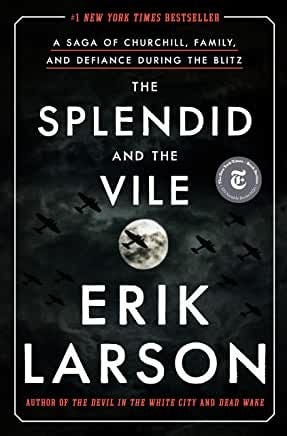
9. The Splendid And The Vile: A Saga of Churchill, Family, and Defiance During The Blitz, Erik Larson
Named “One Of The Best Books Of 2020” by innumerable newspapers — and a book that ranked a NY Times bestseller for nearly a year — “The Splendid And The Vile” focuses on Winston Churchill’s first year as England’s Prime Minister. “This is the year in which Churchill, the cigar-smoking bulldog we all know, when made all his famous speeches and showed the world what courage and leadership look like,” writes Larson.
On Churchill’s first day on the job, Hitler invaded Belgium and Holland. Poland and Czechoslovakia had already fallen, and the Dunkirk evacuation was just two weeks away. For the next twelve months, Hitler would wage a relentless bombing campaign that would kill 45,000 Britons. And it was up to Churchill to keep his own country united and hopeful while trying to convince President Franklin Roosevelt and America to ally with England and other western countries to win WWII.
Imagine facing any of those challenges as a leader.
Before being named Prime Minister, Churchill was a war hero and had been England’s top naval officer, as well as a member of Parliament. So, he surely had great professional experience. But what made Churchill one of the most renowned leaders of the 20th Century was that he was primed for the moment. Knowing he’d inevitably face a serious crisis in his leadership career, he spent many years preparing for that moment. Upon becoming Prime Minister, Churchill said, “I felt as if I were walking with destiny and that all my past life had been preparation for this hour and this trial.”
As a human being, Churchill had many flaws; but in this moment of profound crisis, he was willing and able to step up. He worked tirelessly, managed the details, made tough calls, and deeply inspired his countrymen through exquisite speeches that honored their courage. He demonstrated a striking leadership trait: an instinct to make other people feel loftier, stronger — even invincible. In his finest hour as a leader, he made everyone around him feel confident. For this reason, Churchill is the leader of all eras I admire most.
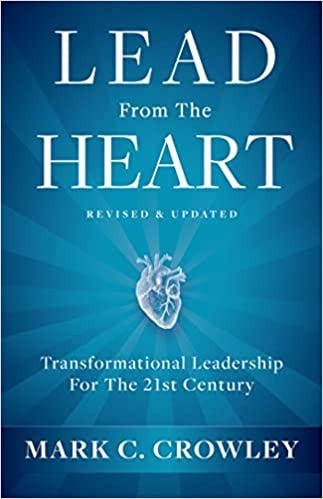
Final Thoughts
I’m the author of the book on your right which has been taught in 10 American universities. And my “Lead From The Heart” podcast has an audience in 163 countries and ranks in the top 1.5% of all the world’s podcasts.
PS: If you have a favorite book you believe every leader should read — and it didn’t make it on my list — please share the name with me. I may do a second edition!
ORIGINAL WRITER ID Please connect with me at MarkCCrowley.com, on LinkedIn, or on Twitter (@MarkCCrowley).
ALL BOOKS AVAILABLE ARE HERE
I am not affiliated with any other companies or organizations mentioned in my responses. My answers are based solely on my training and the information available to me. Any recommendations or opinions expressed are solely mine and should not be considered professional advice. It is always recommended to conduct thorough research before making any decisions or purchases.
Comments
Post a Comment